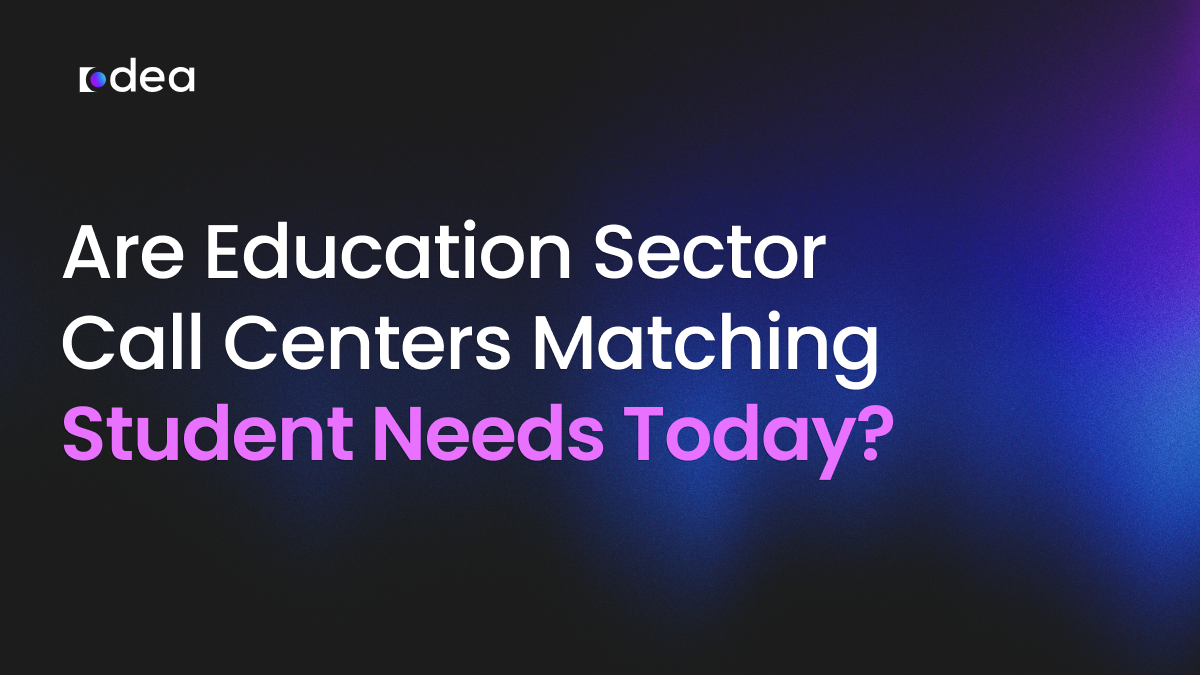In the fast-paced world of education, student expectations are evolving at an unprecedented rate. Today’s students expect a seamless, instant, and personalized experience in every interaction, whether it’s with a tech giant or their educational institution.
Unfortunately, many educational institutions still rely on outdated communication systems, fragmented departments, and overworked staff. This often results in slow response times, frustrated students, and missed opportunities to foster long-lasting relationships.
So, how can schools, colleges, and universities bridge this gap? The solution lies in modern, smart contact centers, powered by Computer Telephony Integration (CTI) and intelligent automation.
At Odea Integration, we specialize in helping educational institutions modernize their communication infrastructure. We believe that schools and universities must move beyond traditional methods to meet the ever-increasing expectations of today’s digitally savvy students.
Our solution, OVA — an AI-powered virtual assistant designed specifically for high-volume educational environments — is a game-changer for creating more efficient, personalized, and scalable student support systems.
Why Contact Centers Are Essential to the Student Journey
The days when students simply visited campuses for face-to-face interactions are long gone. Today’s students are digital-first and expect the same level of efficiency and convenience they experience with companies like Amazon or Apple. Whether it’s applying for admission, checking on financial aid, or registering for courses, students want instant access to information — and they expect fast, responsive support.
Key Reasons Students Reach Out:
- Admission Process: Students have questions about deadlines, application requirements, and scholarships.
- Course Registration: Issues like class selection, prerequisites, or system errors often arise.
- Financial Aid: Payment plans, grants, and pending balances are frequently inquired about.
- Academic Advising: Many students seek help with course selection, planning, or credit transfers.
- Exams and Grading: Access to test results, missed exams, or grading feedback is a common concern.
- Technical Support: Help with online platforms, login failures, and mobile access problems are frequent issues.
Parents, especially in K–12 education, also require transparency and quick responses. Faculty members too rely on contact centers for HR support, scheduling, IT assistance, and operational coordination.
In today’s digital age, having a modern, omnichannel contact center is no longer optional — it’s a necessity.
The Shortcomings of Legacy Call Centers
Traditional call centers often fall short in meeting the needs of today’s students due to a variety of reasons:
- Single-Channel Support: Many institutions still rely on phone-only centers, ignoring students who prefer email, text, or live chat.
- Manual Data Access: Agents struggle to retrieve essential information about student records and prior interactions during calls.
- Limited Hours of Operation: Many institutions close their support desks after business hours, despite students needing help during evenings and weekends.
- High Call Abandonment Rates: During busy periods, calls may be dropped or queued for long durations.
- Lack of Personalization: Every interaction feels like a cold start, even for returning students with ongoing issues.
As a result, students experience delays, inconsistencies, and poor service, creating a disconnect between the institution and its students.
Want to dive deeper into how AI is solving real-world student support challenges? Explore this article for practical insights.
Enter Odea Integration: Smart Solutions for Modern Campuses
At Odea Integration, we believe that the answer to these challenges lies in adopting advanced solutions that can scale and adapt to meet the needs of modern students.
Our CTI and AI-powered tools help create student-centric support systems that are accessible 24/7, across any channel, and customized to meet individual student needs.
Our key offering is OVA — an AI-powered virtual assistant designed specifically for the education sector.
OVA isn’t just a chatbot; it’s an intelligent agent capable of understanding student intent, pulling data from integrated systems, and providing relevant, personalized answers to questions, no matter the time of day.
Meet OVA: Your AI-Powered Campus Support Assistant
OVA is more than a basic automated chatbot. It’s an intelligent virtual agent that handles complex queries, assists with critical tasks, and provides personalized support — all without human intervention, unless necessary.
To better understand how virtual agents are shaping the future of customer support across industries, read The Future of Customer Service: Virtual Agents.
What Can OVA Do?
- Answer frequent questions about enrollment, deadlines, tuition, and scholarships.
- Guide students through the course registration process.
- Provide real-time updates on academic records, transcripts, and exam results.
- Schedule appointments with academic advisors, admissions officers, or faculty members.
- Seamlessly escalate complex cases to live agents, preserving all relevant context.
By handling routine tasks, OVA reduces human agent workloads by up to 60%, according to client case studies.
Omnichannel Support: Meeting Students Where They Are

Today’s students communicate through multiple channels — whether it’s SMS, social media, email, or web chat. Odea’s solutions support all communication channels, allowing students to reach out in their preferred method and continue their conversation without interruption.
For example:
- A student initiates a chat via your website, then switches to SMS while on the move.
- The same student receives a follow-up email the next day, and the conversation continues from where it left off — no need to repeat information.
This seamless omnichannel experience ensures that students stay engaged without the hassle of starting over every time they switch platforms.
Real-Time Data Access: Empowering Agents to Provide Better Service
A key advantage of Odea’s solutions is integration with student information systems (SIS), customer relationship management (CRM) platforms, and ticketing systems. This allows support agents to access full student histories, preferences, and past interactions at the click of a button.
Imagine a scenario where a student calls to follow up on a scholarship application.
With Odea’s system in place, the agent can instantly see the student’s application status, previous interactions, and associated documents — all without having to navigate multiple systems.
This leads to faster issue resolution, higher student satisfaction, and fewer call transfers.
Learn what features to prioritize when choosing a CTI connector for your campus support systems in this article Key Features to Look for in CTI Connectors for Seamless Customer Interactions.
Scalability: Handling High Volumes with Ease
Every educational institution experiences periods of high demand, whether it’s during peak admissions, finals week, or registration time.
Odea’s cloud-based solutions and automation engine can scale to accommodate anywhere from 10 to 10,000 queries, ensuring that your institution’s support services never falter during critical moments.
In addition, the advanced analytics dashboards provided by Odea give administrators valuable insights into peak times, agent performance, and unresolved cases — making it easier to optimize for future high-demand periods.
The Human Touch: Still Key to Student Support

At Odea, we believe in the power of both technology and human connection. While OVA handles most inquiries autonomously, it is designed to recognize when human empathy is required.
The AI can detect emotional cues and escalate sensitive cases to live agents who are fully briefed on the issue.
This hybrid approach — combining AI with human agents — ensures students receive fast, efficient, and empathetic service every time.
Real-World Success: Proven Results from Odea Clients

Institutions using Odea’s CTI solutions have reported:
- 87% increase in first-call resolution.
- 45% decrease in student complaints related to delayed responses.
- 3x faster handling of academic and financial aid inquiries.
- Improved student retention linked to better engagement and personalized service.
Future-Proofing Education: One Interaction at a Time
As education continues to evolve, so do the expectations of students, parents, and faculty. The demand for personalized, instant, and efficient support will only grow. Educational institutions that fail to keep up with these changes risk falling behind.
Odea Integration is here to help institutions not just adapt, but lead. With our smart CTI solutions and AI-powered virtual assistants, we can help you build a future-proof support system that evolves with your institution’s needs.
Conclusion: The Path to Success Starts Here
In today’s digital age, where expectations are higher than ever, the quality of your contact center determines how well you connect with students, parents, and faculty.
By upgrading your support infrastructure with Odea Integration, you’re not just improving efficiency; you’re building a stronger, more engaged educational community.
Contact us today and discover how Odea’s AI-powered solutions, including OVA, can elevate your student support, increase retention rates, and help your institution stay ahead of the curve.
Schedule a free discovery call with our experts today and start transforming your institution’s support system.





